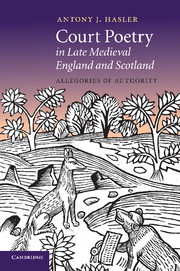Book contents
- Frontmatter
- Contents
- Acknowledgements
- Abbreviations
- Introduction
- 1 Beginnings: André's Vita Henrici Septimi and Dunbar's aureate allegories
- 2 The Bowge of Courte and the birth of the paranoid subject
- 3 “My panefull purs so priclis me”: the rhetoric of the self in Dunbar's petitionary poems
- 4 Translative senses: Alexander Barclay's Eclogues and Gavin Douglas's Palice of Honour
- 5 Mémoires d'outre-tombe: love, rhetoric and the poems of Stephen Hawes
- 6 Mapping Skelton: “Esebon, Marybon, Wheston next Barnet”
- Conclusion
- Notes
- Bibliography
- Index
- CAMBRIDGE STUDIES IN MEDIEVAL LITERATURE
1 - Beginnings: André's Vita Henrici Septimi and Dunbar's aureate allegories
Published online by Cambridge University Press: 04 April 2011
- Frontmatter
- Contents
- Acknowledgements
- Abbreviations
- Introduction
- 1 Beginnings: André's Vita Henrici Septimi and Dunbar's aureate allegories
- 2 The Bowge of Courte and the birth of the paranoid subject
- 3 “My panefull purs so priclis me”: the rhetoric of the self in Dunbar's petitionary poems
- 4 Translative senses: Alexander Barclay's Eclogues and Gavin Douglas's Palice of Honour
- 5 Mémoires d'outre-tombe: love, rhetoric and the poems of Stephen Hawes
- 6 Mapping Skelton: “Esebon, Marybon, Wheston next Barnet”
- Conclusion
- Notes
- Bibliography
- Index
- CAMBRIDGE STUDIES IN MEDIEVAL LITERATURE
Summary
Narratives of origin, in particular dynastic or regnal origin, may not bear very much looking into. Henry of Richmond's's accession to the English throne was based in a tenuous claim and military violence. The marriage of James IV with Henry's eldest daughter Margaret Tudor sealed the misnamed Treaty of Perpetual Peace between England and Scotland of 1502, but in the event marked only a brief cessation in a history of hostility that had included James's clash with his own royal father James III at Sauchieburn in 1488. Both Bernard André's Vita Henrici Septimi, along with the writings of his fellow Latinists at Henry VII's court, and William Dunbar's The Thrissill and the Rois represent these crucial scenes as matters of sight, with André's self-projection as blind vates, and his role as humanist historiographer, mirrored by Dunbar's investment in stylized image and heraldic display. Both texts, while revealing of their contrasted court cultures, seek authority in blindness, absence and the unnamed spaces between figurations of presence, and find it a precarious formation indeed.
“UT CAECUS IN TENEBRIS”: BERNARD ANDRÉ AND THE BLINDNESS OF ORIGINS
Between 1489 and 1490 some important Anglo-French negotiations took place in London. The subject was the control of Brittany, laid open by a Breton ducal minority to the marital designs of the French king, Charles VIII, and the diplomatic standing of the new English regime was highly visible.
- Type
- Chapter
- Information
- Court Poetry in Late Medieval England and ScotlandAllegories of Authority, pp. 19 - 42Publisher: Cambridge University PressPrint publication year: 2011



